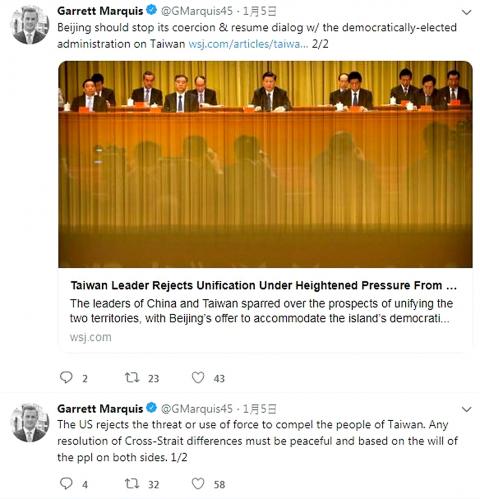The government yesterday thanked US National Security Council spokesman Garrett Marquis for supporting Taiwan’s freedom and democracy in the face of China’s threats, pledging to build a stronger and more solid partnership with the US.
“The US rejects threats or the use of force to compel the people of Taiwan,” Marquis said on Twitter on Sunday.
“Any resolution of Cross-Strait differences must be peaceful and based on the will of the ppl on both sides,” Marquis said, urging Beijing to stop its coercion and resume dialogue with the democratically elected government of Taiwan.

Photo: Screen grab from Twitter
Marquis is the first senior White House official to throw his support behind Taiwan after Chinese President Xi Jinping (習近平) reiterated in a closely watched speech on Wednesday last week his goal of unification and his willingness to use force and “any necessary measures” to defeat foreign intervention and pro-Taiwanese independence “separatists.”
The Ministry of Foreign Affairs yesterday expressed its “heartfelt gratitude” to Marquis for speaking up against China’s threats against Taiwan and for supporting the nation’s democracy and freedom.
The Presidential Office also expressed its gratitude for Marquis’ support, saying that continued close ties between Taipei and Washington and the stability of East Asia are of the utmost importance to not only the two nations, but also to other actors in the region.
As a member of the international community, Taiwan would continue to work closely with the US government to develop a stronger and more solid partnership, the Presidential Office said, vowing to make concerted efforts with its allies to ensure peace, stability and prosperity of the region.
Since Xi’s speech, at least 12 US lawmakers have voiced support for Taiwan through social media.
US Senator Cory Gardner, chairman of the US Senate Foreign Relations Subcommittee on East Asia, the Pacific and International Cybersecurity Policy, on Sunday said on Twitter that the US stands with Taiwan against all forms of Chinese aggression.
“My ARIA [Asia Reassurance Initiative Act] bill enacted into law authorizes US arms sales and high-level visits of US officials to Taiwan. I’ll soon re-introduce in Congress the TAIPEI Act, promoting Taiwan’s global presence,” Gardner said, referring to the Taiwan Allies International Protection and Enhancement Initiative Act.
The version of the draft TAIPEI Act introduced by Gardner in September last year requires a US strategy to engage with governments worldwide to support Taiwan’s diplomatic recognition or strengthen unofficial ties with Taiwan.
It would also authorize the US Department of State to suspend or alter foreign assistance to any government that takes adverse actions to alter or downgrade relations with Taiwan.
Senator Marco Rubio has on Twitter also called for Washington to do more to strengthen ties with Taipei in the face of China’s increasingly aggressive actions and rhetoric, while Senator Ted Cruz has called on the administration of US President Donald Trump to lend Taiwan the support it needs to protect itself from threats from the Chinese Communist Party.

TRAGEDY STRIKES TAIPEI: The suspect died after falling off a building after he threw smoke grenades into Taipei Main Station and went on a killing spree in Zhongshan A 27-year-old suspect allegedly threw smoke grenades in Taipei Main Station and then proceeded to Zhongshan MRT Station in a random killing spree that resulted in the death of the suspect and two other civilians, and seven injured, including one in critical condition, as of press time last night. The suspect, identified as a man surnamed Chang Wen (張文), allegedly began the attack at Taipei Main Station, the Taipei Fire Department said, adding that it received a report at 5:24pm that smoke grenades had been thrown in the station. One man in his 50s was rushed to hospital after a cardiac arrest

SAFETY FIRST: Double the number of police were deployed at the Taipei Marathon, while other cities released plans to bolster public event safety Authorities across Taiwan have stepped up security measures ahead of Christmas and New Year events, following a knife and smoke bomb attack in Taipei on Friday that left four people dead and 11 injured. In a bid to prevent potential copycat incidents, police deployments have been expanded for large gatherings, transport hubs, and other crowded public spaces, according to official statements from police and city authorities. Taipei Mayor Chiang Wan-an (蔣萬安) said the city has “comprehensively raised security readiness” in crowded areas, increased police deployments with armed officers, and intensified patrols during weekends and nighttime hours. For large-scale events, security checkpoints and explosives

A car bomb killed a senior Russian general in southern Moscow yesterday morning, the latest high-profile army figure to be blown up in a blast that came just hours after Russian and Ukrainian delegates held separate talks in Miami on a plan to end the war. Kyiv has not commented on the incident, but Russian investigators said they were probing whether the blast was “linked” to “Ukrainian special forces.” The attack was similar to other assassinations of generals and pro-war figures that have either been claimed, or are widely believed to have been orchestrated, by Ukraine. Russian Lieutenant General Fanil Sarvarov, 56, head

PUBLIC SAFETY: The premier said that security would be tightened in transport hubs, while President Lai commended the public for their bravery The government is to deploy more police, including rapid response units, in crowded public areas to ensure a swift response to any threats, President William Lai (賴清德) said yesterday after a knife attack killed three people and injured 11 in Taipei the previous day. Lai made the remarks following a briefing by the National Police Agency on the progress of the investigation, saying that the attack underscored the importance of cooperation in public security between the central and local governments. The attack unfolded in the early evening on Friday around Taipei Main Station’s M7 exit and later near the Taipei MRT’s Zhongshan